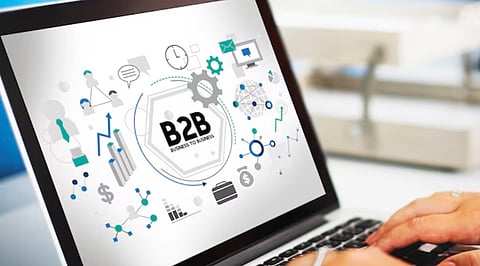

Artificial intelligence has gone beyond theory and hype to something a lot more real: it's becoming the foundation of how B2B business operates. From sales campaigns to sales pipelines and supply-chain logistics, AI is appearing in the operations that deliver outcomes and eliminate waste. Companies that used to rely solely on human research, manual tracking, or infinite spreadsheets are now seeing speed, accuracy, and scale they can't get any other way. While not all departments require AI tomorrow, there are five roles where the technology is already serving its purpose.
Marketing has always been about insights into people, and now AI is providing B2B marketers with sharper tools than ever. AI and data science are being deployed to enable companies to capture gems from seas of information previously impossible to handle. Rather than taking a wild guess about which campaigns will connect, marketers can now look at patterns in customer behavior, search intent, and engagement levels to create strategies that feel relevant and personal.
Consider content marketing. AI can detect what potential customers are investigating and mark the language that produces clicks and conversions. That is, marketing teams can create content that reaches decision-makers rather than spreading a broad net hoping for something. Campaign performance can be monitored in real time with AI tools optimizing ad placements or email sends for maximum efficiency.
Sales teams live or die by the quality of their leads, and anyone who has worked in B2B knows how much time can be wasted chasing the wrong ones. This is where AI has quickly proven its worth. A B2B prospector might use artificial intelligence to comb through massive datasets, highlighting companies and decision-makers who match the exact profile of an ideal customer. Rather than blind cold-calling, this would enable the sales team to initiate conversations with prospects that are more likely to convert.
What gives this such strength isn't so much the amount of data but the context of AI. A B2B prospector won't merely produce a list of names but offers details on industry trends, company expansion, and buying signs, giving the sales representative a better understanding of who they're contacting. That saves time, provides confidence, and maximizes the chances of a good response.
Customer service is not only a B2C concern. B2B customers also have high expectations that include complicated contracts, software integrations, or specialty products. AI is making a significant impact here by cutting down on support functions and providing customers with quicker, more reliable assistance.
Chat systems that are powered by AI can provide automatic responses to mundane questions, for example, account information, delivery status, or step-by-step troubleshooting. For problems that need a human, such systems can gather information beforehand, so service reps begin the process knowing what they're dealing with. That minimizes frustration and accelerates time of resolution.
Numbers are the language of business, and AI has rapidly become proficient in it. In financial services and risk management, AI is breaking through complexity and enabling leaders to make more informed decisions faster.
One of the principal use cases is fraud detection. The AI can pick out suspicious patterns of spending or transactions much faster than manual monitoring, saving businesses from losses. In risk management, AI can analyze market data, customer payment history, and even worldwide events to gauge the probability of late payments or defaults.
Budgeting and forecasting are becoming more acute as well. Rather than merely trusting historical performance, AI applications can factor in variables like seasonality, supply variances, and even competitor behavior. This results in projections that are not only more accurate but more actionable in informing strategy.
Having and retaining the right individuals has always been among the most challenging issues in B2B companies. AI is relieving that stress by enhancing recruitment and talent management processes.
On the hiring side, AI can sift through resumes and applications to find the candidates most similar to the jobs available, reducing the amount of time spent filling positions. It can also eliminate bias since it looks at qualifications and experience instead of subjective criteria. In the case of companies with high volume recruitment, this speed is revolutionary.
After onboarding employees, development can be addressed by AI. Training platforms can recommend customized learning pathways based on performance data so that the staff acquire skills required for success. Predictive analytics can even spot at-risk employees, providing HR departments with an opportunity to address issues before turnover occurs.
By enhancing hiring and retention, AI benefits B2B businesses in being more stable and consistent, particularly in fields where technical expertise is paramount. The outcome is a staff that's more energetic, more qualified, and more aligned with business objectives.
